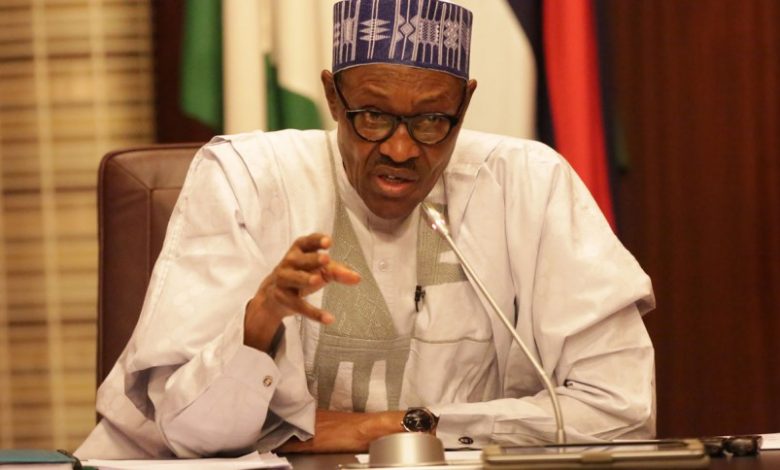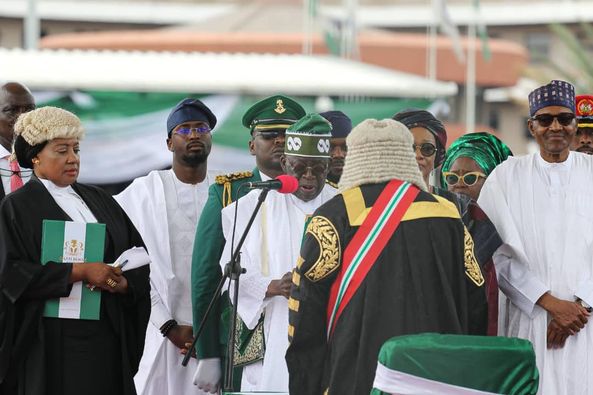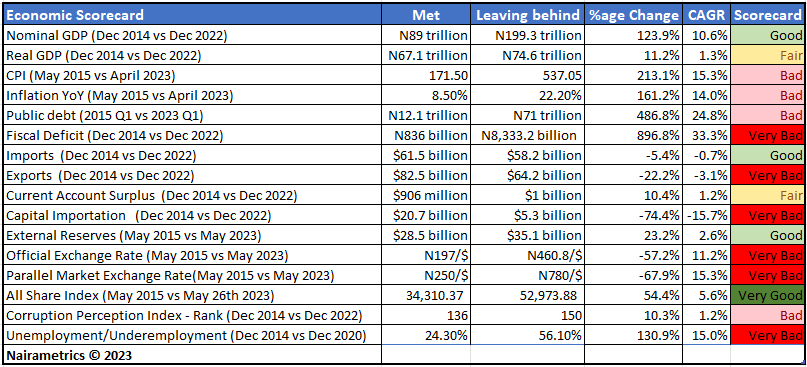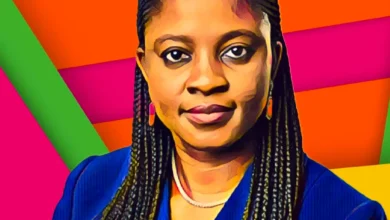The economy Buhari met versus what he is leaving behind for Tinubu

Summary
- Under President Muhammadu Buhari’s tenure, Nigeria faced challenges such as insecurity, corruption, and poor governance, resulting in a mixed economic performance.
- Bola Tinubu will become Nigeria’s new president on May 29, 2023 and he will be faced with the task of reviving the country’s struggling economy.
- Tinubu’s priorities include promoting economic growth, tackling inflation, addressing fiscal deficit and public debt, attracting investment, and combating corruption and unemployment.
Nigeria’s new president, Bola Tinubu, will take office on Monday, May 29, 2023, after being announced as the winner of the presidential election in February.
He will face the daunting task of reviving the country’s economy, which has been battered by insecurity, corruption, and poor governance under his predecessor, Muhammadu Buhari.
Buhari came to power in 2015 with a promise to fight corruption, defeat terrorism, and diversify the economy away from oil dependence. However, his tenure was marked by a recession in 2016-2017, a devaluation of the naira, a rise in inflation and unemployment, and a decline in foreign investment.

He also failed to contain the violence perpetrated by criminal gangs, jihadist groups, and separatist movements across the country.
The following table shows some of the key economic indicators under Buhari’s administration, comparing the figures at the end of 2014 (before he took office) and at the end of 2022 (before he left office).
Economic Scorecard Buhari
President Buhari’s Economic Scorecard

As can be seen from the table, Buhari’s economic performance was mixed at best, and dismal at worst.
News continues after this ad
- While he managed to increase the GDP size and the external reserves, he also presided over a massive increase in public debt and fiscal deficit, a sharp decline in exports and capital importation, a soaring inflation and unemployment rate, and a weakening of the naira against the dollar.
We collated the outgoing president’s economic scorecard which are as follows.
GDP: Navigating Growth Opportunities and Challenges
The size of Nigeria’s Gross Domestic Product (GDP) is a crucial measure of the overall economic performance and productivity of the country.
- Under President Buhari’s administration, Nigeria’s GDP size witnessed a substantial increase, growing from N90.1 trillion in December 2014 to N202 trillion by December 2022 in nominal terms.
- However, in real terms, the economic growth has been anemic and not enough to create jobs and attract investments.
- Buhari inherited a real GDP of N67.9 trillion and is exiting with real GDP at about N75.7 trillion which translates to a compounded annual GDP growth rate of 1.6%.
As Bola Ahmed Tinubu takes over, he will have to focus on policies that can propel economic growth from the tepid rate left by Buhari to a faster GDP growth rate.
This involves implementing policies that promote diversification, support key sectors such as agriculture, manufacturing, and services, and encourage entrepreneurship and innovation.
Inflation: Tackling Rising Prices and Restoring Purchasing Power
One of the significant challenges facing Nigeria’s economy is the persistent inflationary pressures.
- During Buhari’s administration, there has been a notable increase in both the Consumer Price Index (CPI) and current inflation rates.
- From May 2015 to April 2023, the CPI rose from 171.50 to 537.05, while the current inflation rate increased from 8.50% to 22.20%.
- In fact, between April 2023 and May 2015, CPI change delivers an inflation rate of 213% in the period.
Addressing inflation will be a top priority for Tinubu’s administration. To curb rising prices and restore purchasing power, Tinubu must implement effective monetary policies, strengthen fiscal discipline, and promote price stability.
This includes measures such as controlling the money supply, enhancing agricultural productivity, reducing import dependence, and fostering a competitive business environment.
Fiscal Deficit: Navigating the Path to Fiscal Sustainability
The fiscal deficit is a crucial measure of the government’s budgetary imbalance, representing the shortfall between revenue and expenditure.
- During President Buhari’s tenure, Nigeria witnessed a significant increase in the fiscal deficit, with the deficit rising from N836 billion in December 2014 to N8.3 trillion by December 2022.
- The rise in Fiscal deficit arose out of the Buhari administration’s policy of large but unfunded budgeted expenditures.
- Addressing the fiscal deficit will be a top priority for Bola Ahmed Tinubu’s administration.
Tinubu must implement prudent fiscal policies aimed at reducing the deficit and achieving fiscal sustainability.
Public Debt: Mounting Challenges for Tinubu’s Administration
One of the most pressing challenges that Bola Ahmed Tinubu will face as he takes charge of the Nigerian economy is the country’s mounting public debt.
- During President Buhari’s tenure, the public debt increased significantly from N12.1 trillion in 2010 Q1 to a staggering N71 trillion in 2023 Q1.
- This exponential rise in debt poses a serious risk to the economy, as it increases the burden on future generations and limits the government’s ability to invest in crucial sectors.
Tinubu must prioritize implementing effective debt management strategies to reduce the debt burden and ensure long-term economic sustainability.
This includes exploring avenues for debt restructuring, increasing revenue generation, and improving fiscal discipline.
Capital Importation: Fostering Investment and Economic Growth
Capital importation refers to the inflow of investment from foreign sources into a country.
- During President Buhari’s administration, Nigeria experienced a decline in capital importation, with figures dropping from $20.7 billion in December 2014 to $5.3 billion by December 2022.
- Fostering capital importation will be a key priority for Bola Ahmed Tinubu as he takes charge of the Nigerian economy.
Tinubu must work towards creating an attractive investment climate that encourages both domestic and foreign investors to bring capital into the country.
This involves implementing policies that enhance the ease of doing business, protect investor rights, and provide incentives for investment in strategic sectors.
External Reserves: Building Resilience in Uncertain Times
The state of Nigeria’s external reserves is another critical aspect that Tinubu will need to address.
- During Buhari’s administration, the external reserves increased from $28.5 billion in May 2015 to $35.1 billion in May 2023.
- Whilst the government has relied more on crude oil exports to boost external reserves, the Buhari administration relied on external loans.
- These reserves act as a buffer against external shocks and provide confidence to investors.
Tinubu must focus on maintaining and expanding the country’s external reserves to ensure economic stability and investor confidence.
Exchange Rate: Pursuing Stability Amidst Volatility
Exchange rate stability is crucial for economic stability and investor confidence. However, during Buhari’s tenure, Nigeria witnessed significant fluctuations in its exchange rates.
- The official exchange rate rose from N197/$ in May 2015 to N460.8/$ in May 2023, while the parallel market exchange rate increased from N250/$ to N780/$ during the same period.
- A lot of the challenges we had with exchange rate stability emanate from the president’s stand on not permitting a free-floating exchange rate or at least one that adjusts to market realities.
- This affected the central bank’s independence, forcing them to adopt unorthodox policies to maintain artificial stability. The result is multiple exchange rate windows and a huge disparity between the official and black markets.
Tinubu faces the challenge of promoting exchange rate stability and curbing volatility. This requires implementing prudent monetary policies, strengthening the foreign exchange market, and addressing the root causes of exchange rate pressures.
All Share Index: Navigating Opportunities in the Stock Market
The All Share Index (ASI) is a key indicator of the performance of the Nigerian stock market.
- Under Buhari’s administration, the ASI experienced significant growth, rising from 34,310.37 points in May 2015 to 52,403.51 points in May 2023.
- Despite a dearth of foreign portfolio investor participation, the stock market has performed relatively well.
- Most sectors have posted higher revenue and profitability growth, rewarding shareholders with dividend payments and avoiding a massive crash.
As Tinubu takes the helm, he must capitalize on the momentum of the stock market and further encourage investment.
This involves implementing investor-friendly policies, strengthening market regulations, and promoting transparency and corporate governance.
By nurturing a conducive environment for the stock market to thrive, Tinubu can attract domestic and foreign investors, drive economic growth, and create wealth for the Nigerian people.
Corruption Perception: Rebuilding Trust and Enhancing Transparency
The perception of corruption is a critical factor influencing investor confidence, economic development, and governance.
- Despite coming into power on the basis of fighting corruption, during President Buhari’s tenure, Nigeria’s Corruption Perception Index (CPI) rank slightly deteriorated, moving from 136 in December 2014 to 150 in December 2022.
- Nigerians went from all-out endemic corruption to systemic and concentrated corruption funded not by crude oil sales but by deficit financing.
- This indicates the persistence of corruption challenges that Bola Ahmed Tinubu will need to address.
Tinubu must prioritize anti-corruption measures and initiatives to restore trust and enhance transparency in the Nigerian economy.
This entails strengthening institutions responsible for combating corruption, implementing effective anti-corruption policies, promoting accountability and integrity in public and private sectors, and encouraging citizen participation.
Unemployment: Fostering Job Creation and Skills Development
High unemployment and underemployment rates pose significant challenges for the Nigerian economy.
- During Buhari’s administration, the unemployment and underemployment rate worsened, reaching a concerning 56.10% by the end of 2020.
- The lack of quality jobs has also contributed to one of the largest brain drains and mass migrations out of the country, especially by young Nigerians looking for a better life outside the country.
By fostering a conducive environment for job creation and equipping the workforce with the necessary skills, Tinubu can address the unemployment challenge, reduce poverty, and foster inclusive economic growth in Nigeria.
It is worth noting that tackling corruption and unemployment are intertwined challenges, and progress in one area can positively impact the other.
Buhari on his legacy
Buhari defended his legacy in his farewell speech on Sunday, saying he had done his best to improve the lives of Nigerians. He also congratulated Tinubu on his victory and said Nigerians had chosen well. He expressed confidence that Tinubu would lead Nigeria to higher levels of development and prosperity.
Tinubu is a former governor of Lagos state and a leader of the ruling All Progressives Congress (APC) party. He is widely regarded as a political mastermind and a savvy businessman who transformed Lagos into a modern megacity during his tenure from 1999 to 2007.
During his campaign, Tinubu promised to tackle the security challenges facing Nigeria by reforming the armed forces and strengthening the intelligence agencies. He also pledged to revive the economy by creating jobs, boosting infrastructure, diversifying revenue sources, reducing poverty, and fighting corruption.
However, Tinubu will have to overcome many obstacles to fulfill his promises. He will have to deal with the entrenched interests of powerful politicians and businessmen who may resist his reforms. He will also have to balance the demands of various ethnic and religious groups who may feel marginalized or threatened by his policies.
Tinubu has a lot of work ahead of him as he inherits an economy that is struggling to recover from years of mismanagement and instability under Buhari. He will need to act swiftly and decisively to restore confidence and hope among Nigerians who are eager for change.




